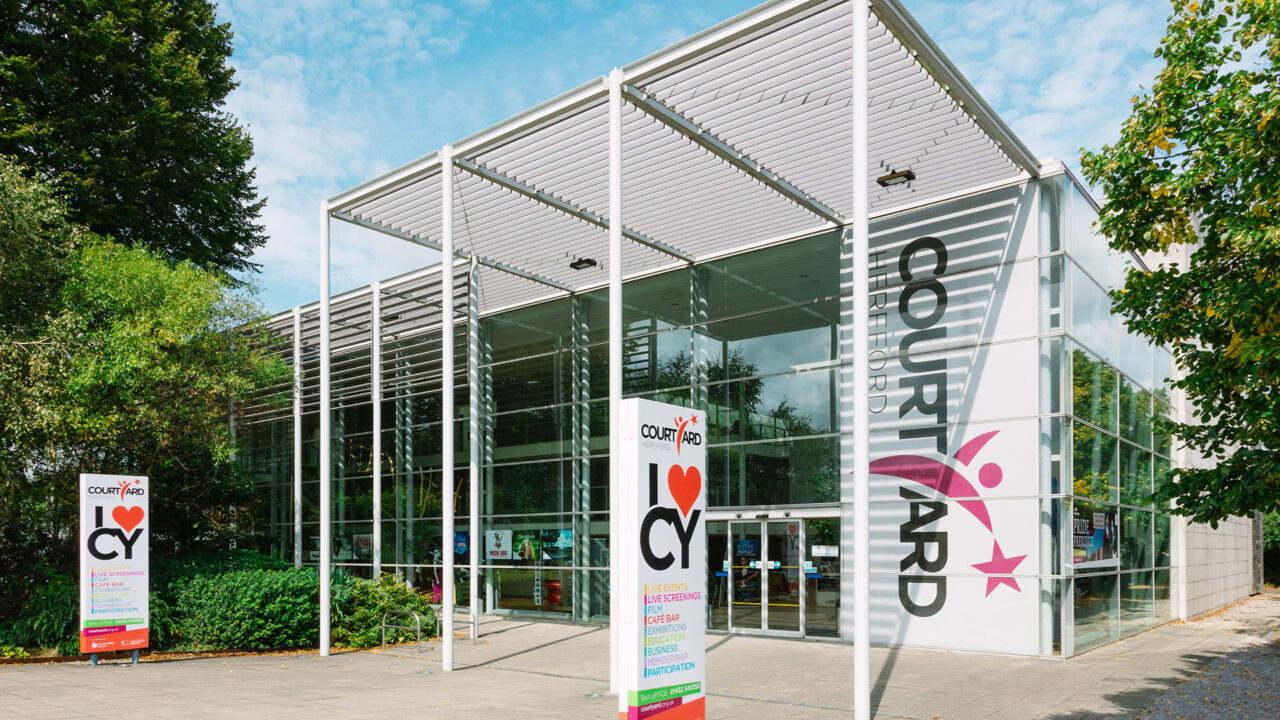- Posted on August 23rd, 2025
Story of Change: The Courtyard

From Incremental Steps to Bold Change: The Courtyard’s Sustainability Story
The Courtyard, based in Hereford, is a vibrant multi-arts venue that welcomes around 400,000 visitors annually. Known for its role in fostering creativity and community, the 27-year-old building includes a 400-seat main auditorium and three flexible studio spaces. These spaces have enabled the centre to deliver a wide range of programmes. Nonetheless, ageing infrastructure has posed challenges, particularly in terms of energy efficiency and environmental sustainability.
Background
Prior to joining the Capital Investment Ready Programme, the Courtyard had already taken steps toward sustainability by establishing environmental principles across the organisation, conducting an energy audit, and identifying key projects to improve energy efficiency and reduce their carbon footprint. For example, they previously participated in the Julie’s Bicycle and Arts Council England Accelerator Programme, which helped them to reduce the impact of audience travel to their rural venue. Their approach was incremental, focusing on one project at a time to minimise financial risk. Initial efforts, such as securing funding for solar photovoltaic installations, laid the groundwork for their decarbonisation journey. However, the sustainability team faced challenges in convincing the Board of the value of these initiatives and the initial investments needed to start projects, and progress was slow. Despite this, the sustainability team secured funding independently, showing the Board the benefit of the work.
Capital Investment Ready: A Turning Point
The Capital Investment Ready Programme acted as a turning point for the Courtyard, equipping them with tools, resources, and expert guidance to advance their sustainability goals. The Courtyard found Julie’s Bicycle’s Creative Climate Tools and Pilio’s energy management tools particularly advantageous, for measuring and demonstrating their progress to potential funders. This data-driven approach proved instrumental as an engagement mechanism, helping to build their credibility and to secure meetings with major funders.
The programme also provided valuable peer learning opportunities as well as mentorship through 1:1 support sessions. By participating in the programme’s webinars, and networking with other venues, the Courtyard team gained insights into best practices. They identified innovative opportunities within their geography to explore for decarbonisation, such as looking to join the Hereford Heat Network (a local district heat network).
Pivoting for Impact
One of the most significant outcomes of the programme was the ability to pivot their focus when necessary. Initially, the Courtyard aimed to electrify their heating system, but financial constraints led them to prioritise a £400,000 LED stage lighting project instead. This decision, supported by programme tools and expert advice, allowed them to achieve a 90% reduction in energy consumption for stage lighting, reducing running costs and significantly lowering their carbon footprint.
Affiliation with the programme and a cohort of high-profile venues enhanced their reputation, helping them attract attention from stakeholders and funders, increasing stakeholder confidence and helping them to secure higher levels of funding. Their visibility led to increased donations, including substantial contributions from new supporters.
Additionally, the programme’s support enabled the Courtyard’s leadership to participate in high-profile events, such as the Theatres Trust Conference, where they highlighted their LED lighting project as a case study. This raised their profile further and attracted further community and stakeholder interest.
Looking Ahead
Building on the momentum generated by the Capital Investment Ready Programme, the Courtyard is working to raise the remaining £92,000 needed to complete their LED lighting project. At the same time, they are exploring opportunities to participate in the Hereford Heat Network initiative, which could provide access to renewable energy and significantly reduce heating costs by 2027.
The programme has underscored the importance of maintaining a diverse portfolio of sustainability projects, which allows the Courtyard to adapt to changing circumstances and funding opportunities. By continuing to leverage expert advice and prioritising environmental stewardship, the Courtyard aims to remain a leader in sustainability within the arts sector, inspiring other organisations to follow their example.
